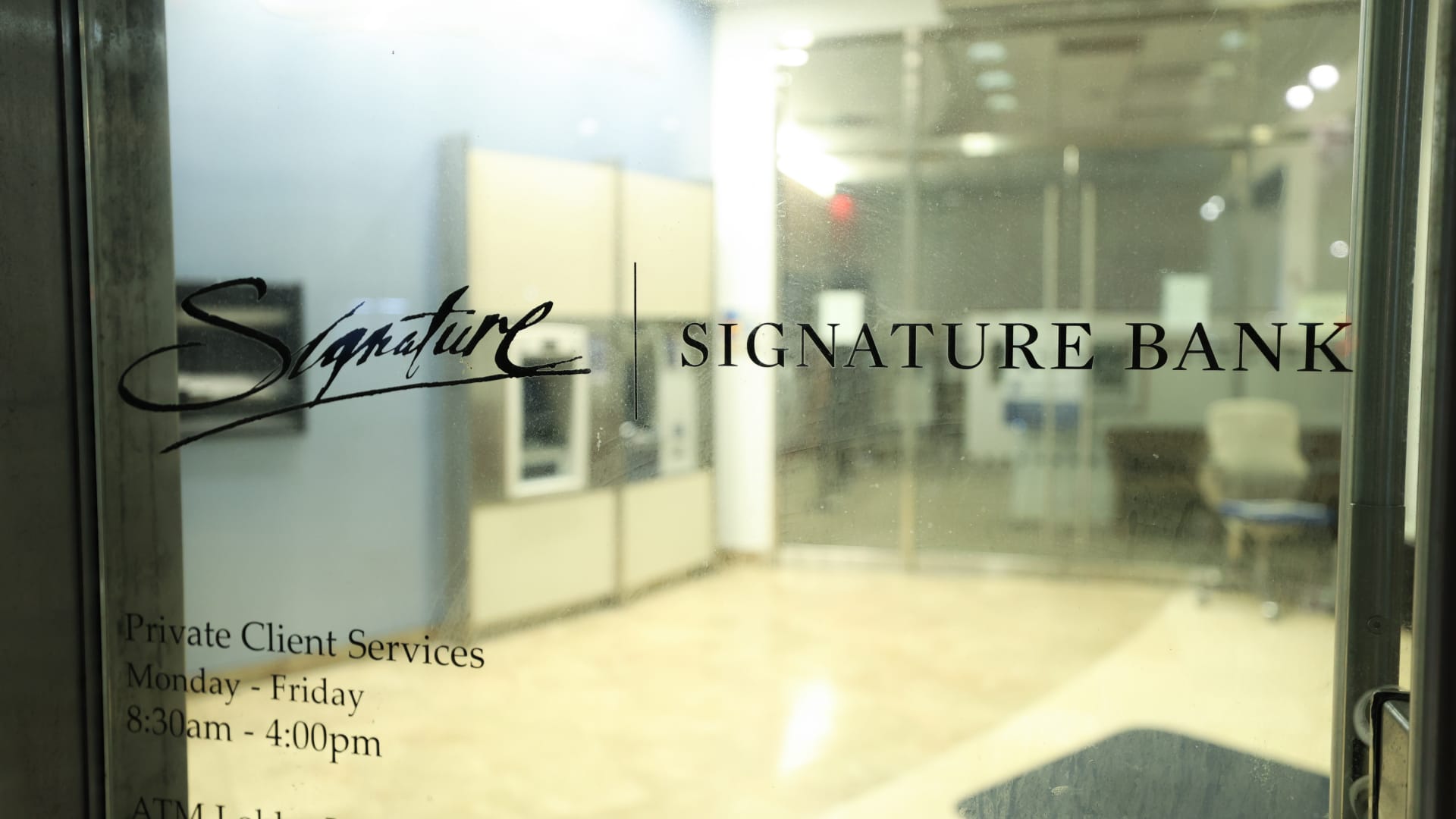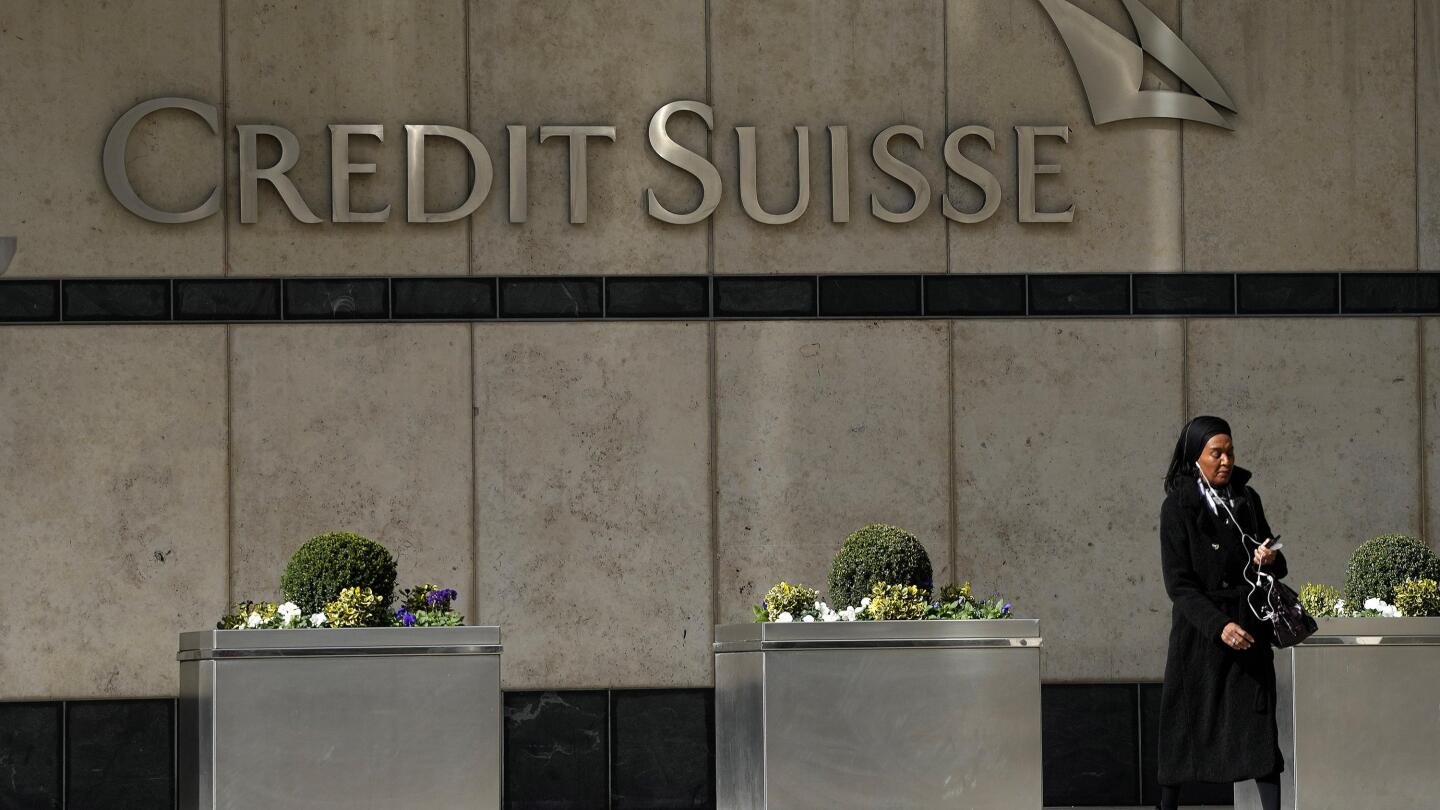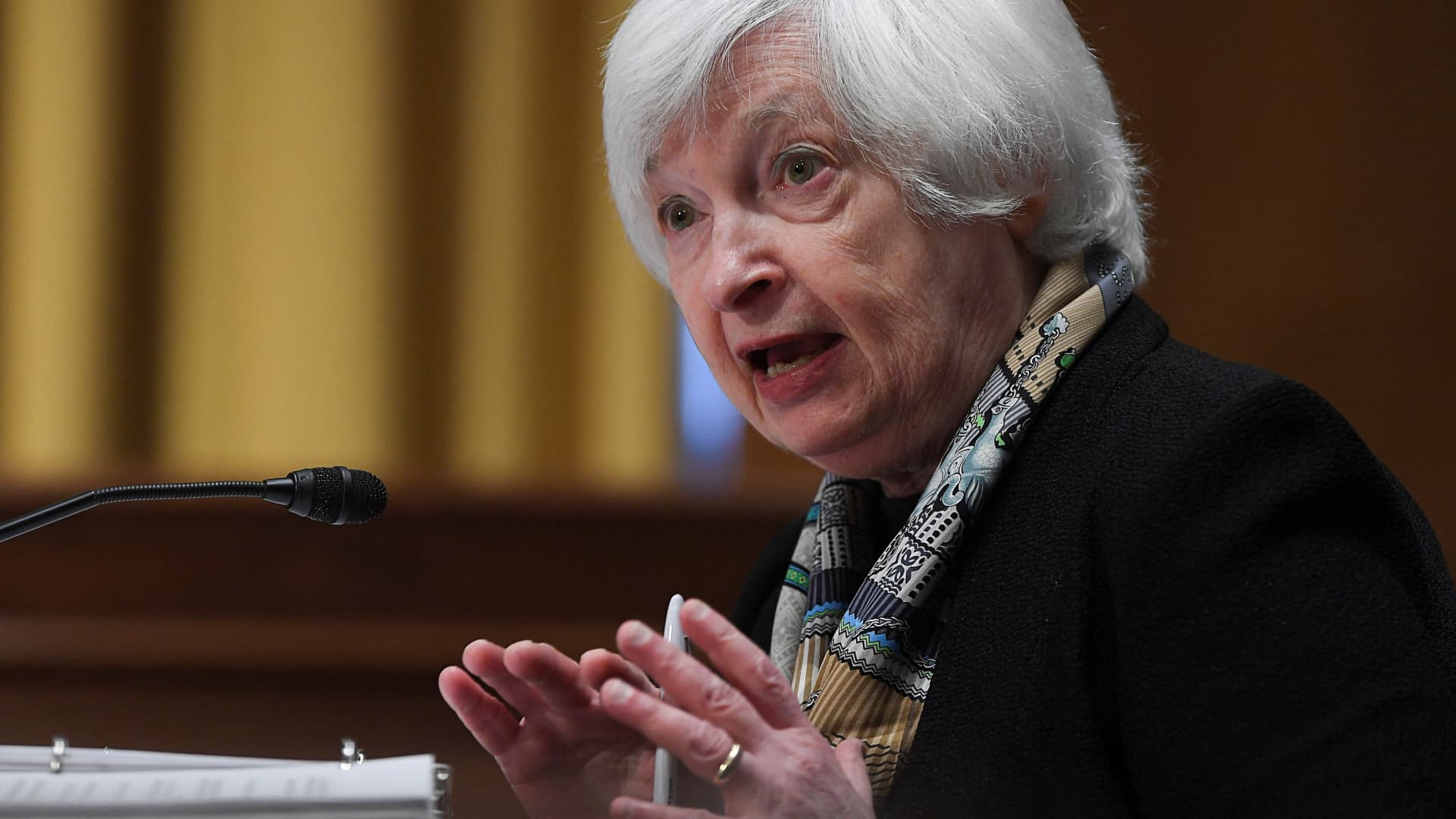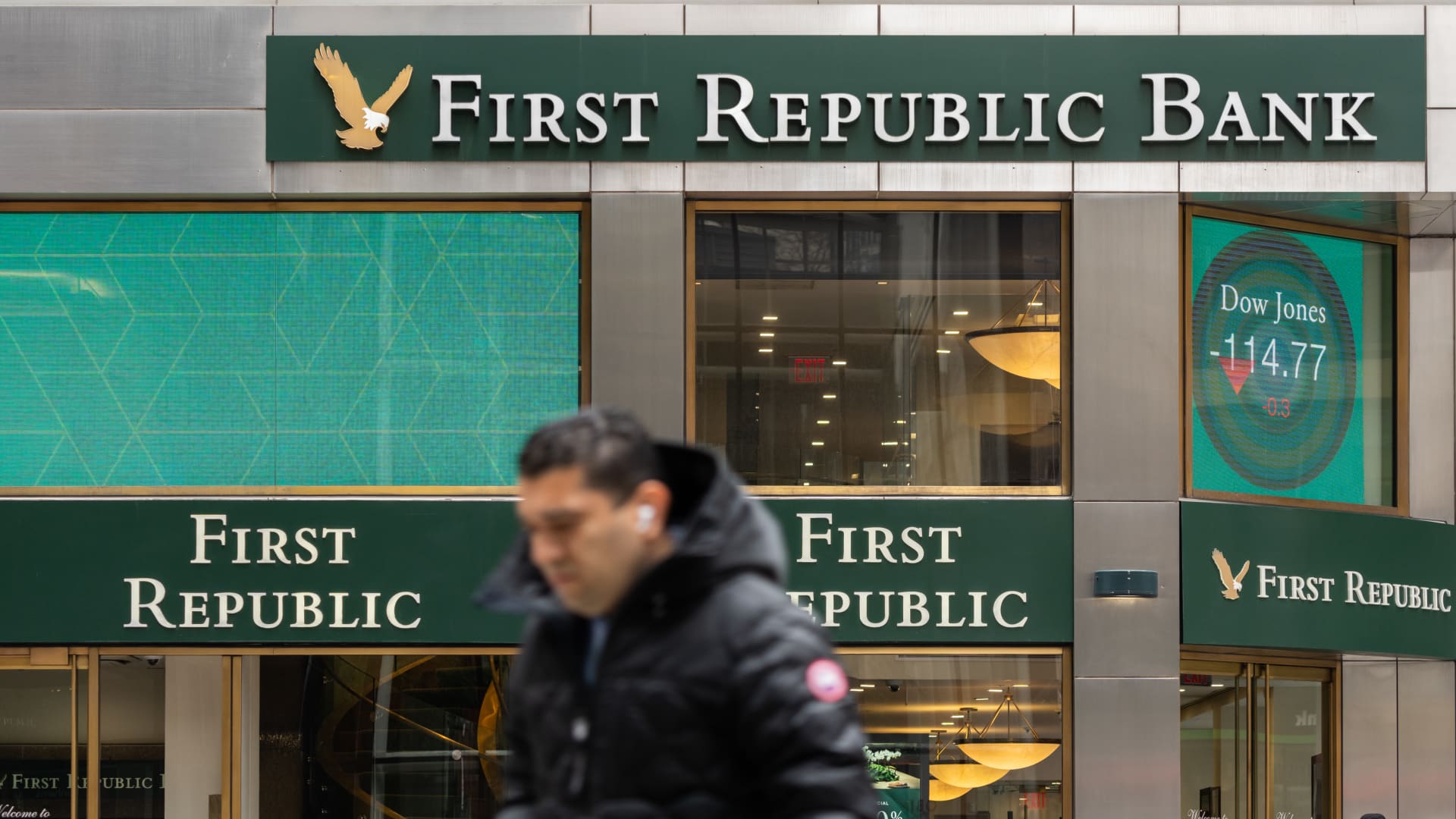You are using an out of date browser. It may not display this or other websites correctly.
You should upgrade or use an alternative browser.
You should upgrade or use an alternative browser.
The complaints of inflation are insane.
- Thread starter Hygro
- Start date
The closure of Signature Bank, the third-largest bank failure in U.S. history, might have been just because regulators wanted to send a message against crypto. 

 www.cnbc.com
www.cnbc.com
No insolvency?
I hope former Representative Frank is mistaken.

 finance.yahoo.com
finance.yahoo.com


Why regulators seized Signature Bank in third-biggest bank failure in U.S. history
The swift move shocked executives of Signature Bank, said board member and former congressman Barney Frank.
...According to Frank, Signature executives explored “all avenues” to shore up its situation, including finding more capital and gauging interest from potential acquirers.
The deposit exodus had slowed by Sunday, he said, and executives believed they had stabilized the situation.
Instead, Signature’s top managers have been summarily removed and the bank was shuttered Sunday.
Regulators are now conducting a sales process for the bank, while guaranteeing that customers will have access to deposits and service will continue uninterrupted...
...For his part, Frank, who helped draft the landmark Dodd-Frank Act after the 2008 financial crisis, said there was “no real objective reason” that Signature had to be seized.
“I think part of what happened was that regulators wanted to send a very strong anti-crypto message,” Frank said.
“We became the poster boy because there was no insolvency based on the fundamentals.”
No insolvency?
I hope former Representative Frank is mistaken.

What Signature Bank Failure Means for Crypto, According to Experts
The collapse of Silicon Valley Bank and the subsequent measures regulators took to avoid more damage on March 12 due to fears of contagion prompted the FDIC and the Federal Reserve to close...
At the time, many in the industry saw Signature as the last resort for crypto companies to be able to have ties to traditional financial institutions, and they believed the bank most likely would take over as the go-to bank for the digital asset industry.
Hygro
soundcloud.com/hygro/
As far as I can tell, SVB is the one bank that was doing everything "right". They were loaning to businesses creating value, and had big capital reserves that got f***d with some of the fastest changes in interest rates.Somebody better hang.
Lexicus
Deity
The closure of Signature Bank, the third-largest bank failure in U.S. history, might have been just because regulators wanted to send a message against crypto.

Why regulators seized Signature Bank in third-biggest bank failure in U.S. history
The swift move shocked executives of Signature Bank, said board member and former congressman Barney Frank.www.cnbc.com
No insolvency?
I hope former Representative Frank is mistaken.

What Signature Bank Failure Means for Crypto, According to Experts
The collapse of Silicon Valley Bank and the subsequent measures regulators took to avoid more damage on March 12 due to fears of contagion prompted the FDIC and the Federal Reserve to close...finance.yahoo.com
This just goes to show how far Obama fudged up by not doing this to all the banks in 2009.
I had breakfast this morning with a former Citi bank manager. His take is that SVB was run by a bunch of non bankers (VC folks) who poorly managed their assets by focusing on near zero rate treasuries (no diversity) and when the interest rates rose and there was a run, they got caught in the cash crunch they could not get out of.As far as I can tell, SVB is the one bank that was doing everything "right". They were loaning to businesses creating value, and had big capital reserves that got f***d with some of the fastest changes in interest rates.
Last edited:
Hygro
soundcloud.com/hygro/
Here's the guy who wrote their risk software's take
That is not what this guy says on youtube. His points:As far as I can tell, SVB is the one bank that was doing everything "right". They were loaning to businesses creating value, and had big capital reserves that got f***d with some of the fastest changes in interest rates.
- They were a bank for start-ups. Start-ups are susceptible to running out of money as investors find borrowing more expensive so will likely withdraw when interest rates rise
- They kept a very large proportion of their assets in 5-10 years bonds, that go down in value when interest rates rise
- They had not risk manager for most of last year
- Their numbers look like they had no hedging
- The fed telegraphed their intention to raise interest rates for quite a lot of this time
- They did not do anything about it
That sounds like he thought risk management started and stopped with the feds regulations. And he wrote the software that was supposed to do the calculation that guy I quoted above above has just done? I may be seeing a problem.So SVB (using my software) were perfectly capitalized against credit risk. They faithfully followed government regulations and Federal Reserve guidance on future interest rates. Now SVB is no more. And that's how regulating the last crisis always sows the seeds for the next one..
EnglishEdward
Deity
If banks or insurance companies etc are prudent they monitor their portfolios of assets and
liabilities AND if they consider they are dangerously exposed in a particular sector or to a particular
trend, there are a wide variety of vehicles available to them to spread that risk to other corporates.
But the thing is there is a cost to doing that, firstly administrative and more significantly expected profit;
i.e. if company shares its risks with other corporates; they demand a share of any future profits.
If SVB didn't do that; they were incompetent or gambling.
liabilities AND if they consider they are dangerously exposed in a particular sector or to a particular
trend, there are a wide variety of vehicles available to them to spread that risk to other corporates.
But the thing is there is a cost to doing that, firstly administrative and more significantly expected profit;
i.e. if company shares its risks with other corporates; they demand a share of any future profits.
If SVB didn't do that; they were incompetent or gambling.
Couple more points from the video above:If SVB didn't do that; they were incompetent or gambling.
- From their accounts, "portfolio duration" and "hedge adjusted portfolio duration" are the exact same number (5.6 years). That means they had no hedges in place.
- Senior management sold millions of shares in the bank in the weeks leading up to the collapse
- Employees receive bonuses on Friday morning, hours before regulators seized the bank
innonimatu
the resident Cassandra
- Joined
- Dec 4, 2006
- Messages
- 15,338
The closure of Signature Bank, the third-largest bank failure in U.S. history, might have been just because regulators wanted to send a message against crypto.
I'm still amazed that the cryptobros failed in their attempt to buy enough politicians to legalize their scams. Looking at the payouts they made, it may have been a close thing!
Farm Boy
I hope you dance
- Joined
- Sep 8, 2010
- Messages
- 28,269
In the kindest possible terms that is total bull****. Banks getting combined with investment and speculatory functions continues to play screwjob on everyone.As far as I can tell, SVB is the one bank that was doing everything "right". They were loaning to businesses creating value, and had big capital reserves that got f***d with some of the fastest changes in interest rates.
When everything is leveraged so hard that the monopoly money collapses in the dreamt-up fever dreams of tech, that was exactly the wishful thinking high-as-a-kite-return industry that slowing inflation is designed to disrupt and destroy where it is inadequately grounded. Which then creates the room for the government to spend money back into the system. Build some of those damn windmills or some ****. But no. We can't have the rich lose anything, so we'll buy back their bond losses for them. Instead we'll slowly destroy in the middle and at the bottom. That's the choice that was just made.
The next brick falls
Shares of Credit Suisse lose more than a quarter of their value in one day, dragging down European and US markets.
Shares in Credit Suisse have plunged and dragged down other major European lenders as fears about deeper problems in the world banking system have spread in the wake of bank failures in the United States.
Credit Suisse shares lost more than a quarter of their value on Wednesday, hitting a record low after the Swiss bank’s biggest shareholder, the Saudi National Bank, told news outlets that it would not inject more money into the bank, which was beset by problems long before the US banks collapsed.
The turmoil caused an automatic suspension in trading of Credit Suisse shares on the Swiss market and sent stock in other European banks tumbling, some by double digits.
That fanned new fears about the health of financial institutions following the recent collapse of Silicon Valley Bank and Signature Bank in the US.
Shares of Credit Suisse lose more than a quarter of their value in one day, dragging down European and US markets.
Shares in Credit Suisse have plunged and dragged down other major European lenders as fears about deeper problems in the world banking system have spread in the wake of bank failures in the United States.
Credit Suisse shares lost more than a quarter of their value on Wednesday, hitting a record low after the Swiss bank’s biggest shareholder, the Saudi National Bank, told news outlets that it would not inject more money into the bank, which was beset by problems long before the US banks collapsed.
The turmoil caused an automatic suspension in trading of Credit Suisse shares on the Swiss market and sent stock in other European banks tumbling, some by double digits.
That fanned new fears about the health of financial institutions following the recent collapse of Silicon Valley Bank and Signature Bank in the US.
Some good perspective here on the rescue of people above $250,000 at the two failed banks.
Also, Credit Suisse is borrowing $54 billion from the Swiss Central Bank.

 apnews.com
apnews.com
The main problem is all these low-interest government bonds are just as good as cash.
Unless there is tidal wave of new government bonds that pay a way, way higher interest rate.
Then to find a buyer, the price for the old ones must come down a tiny bit.
This tiny discount gets bigger every time central banks raise interest rates.
The obvious solution is to hold the bond until it matures in a few years.
Don't take any discount.
But then it really isn't as good as cash anymore.
Should work ok unless there is a bank run with everyone moving their money to JPMorgan.
Just need to sell some of our 1% government bonds for some quick cash to pay off our leaving customers and ... uh oh.
Also, Credit Suisse is borrowing $54 billion from the Swiss Central Bank.

Credit Suisse shares soar after central bank offers lifeline
Credit Suisse shares surged after the Swiss central bank agreed to loan the bank up to 50 billion francs ($54 billion) to bolster confidence in the country’s second-biggest lender following the collapse of two U.S. banks.
The main problem is all these low-interest government bonds are just as good as cash.
Unless there is tidal wave of new government bonds that pay a way, way higher interest rate.
Then to find a buyer, the price for the old ones must come down a tiny bit.
This tiny discount gets bigger every time central banks raise interest rates.
The obvious solution is to hold the bond until it matures in a few years.
Don't take any discount.
But then it really isn't as good as cash anymore.

Should work ok unless there is a bank run with everyone moving their money to JPMorgan.
Just need to sell some of our 1% government bonds for some quick cash to pay off our leaving customers and ... uh oh.
Moriarte
Immortal
- Joined
- May 10, 2012
- Messages
- 2,666

Banks Rush To Borrow Record-Breaking $165 Billion From Fed After SVB Failure
The collapse of Silicon Valley Bank has caused major concerns about the stability of lesser-known regional banks.
 www.forbes.com
www.forbes.com
Banks worried about liquidity in the wake of Silicon Valley Bank’s collapse took out a combined $164.8 billion in loans from the Federal Reserve over the past week, according to Fed statistics released Thursday, topping a record set during the 2008 financial crisis.
It seems things are heating up in the financial sector. SVB, Credit Suisse, First Republican, Signature Bank. Probably more in the making. Anyone else thinks this is the turning point for raising interest rates?

Treasury Secretary Yellen says not all uninsured deposits will be protected in future bank failures
Treasury Secretary Janet Yellen sought to reassure markets and lawmakers that the government will protect U.S. bank deposits amid a rash of bank failures.
Will the deposits in every community bank in Oklahoma, regardless of their size, be fully insured now?” asked Lankford. “Will they get the same treatment that SVB just got, or Signature Bank just got?”
Yellen acknowledged they would not.
Uninsured deposits, she said, would only be covered in the event that a “failure to protect uninsured depositors would create systemic risk and significant economic and financial consequences.”
Lankford said the impact of this standard would be that small banks would be less appealing to depositors with more than $250,000, the current FDIC insurance threshold
Goodbye small banks!
I am shocked, shocked that big money depositors in California and New York get all their money instantly.
But if the same happened in the Midwest at a smaller bank, those noobs can get what they get after a year in bankruptcy court.
No government bailout of non-insured desposits for them.
They are not systemically important.

The Treasury Secretary said so.
The big banks win again.
In fact, they are winning so much...

Wall Street rides to the rescue as 11 banks pledge First Republic $30 billion in deposits
The news comes after First Republic's stock has been pummeled in recent days, sparked by the collapse of Silicon Valley Bank and Signature Bank.
They are depositing billions into a smaller bank to help stabilize the system until the low interest government bonds mature another year or two and being forced to sell them won't have such a big loss.
Or interest rates drop again doing the same thing.
From the good of their hearts of course.

Hopefully they don't just withdraw it all at once some day when their small business rival has a misstep.
Last edited:
Lexicus
Deity
Yet if we nationalized the banks how many of those folks would be screaming about communism? Conversely, if the Biden administration did nothing and let the banks fail and there was a financial crisis as a result, do you think those folks would blame Biden for that?
Treasury Secretary Yellen says not all uninsured deposits will be protected in future bank failures
Treasury Secretary Janet Yellen sought to reassure markets and lawmakers that the government will protect U.S. bank deposits amid a rash of bank failures.www.cnbc.com
Goodbye small banks!
I am shocked, shocked that big money depositors in California and New York get all their money instantly.
But if the same happened in the Midwest at a smaller bank, those noobs can get what they get after a year in bankruptcy court.
No government bailout of non-insured desposits for them.
They are not systemically important.
The Treasury Secretary said so.
The big banks win again.
In fact, they are winning so much...

Wall Street rides to the rescue as 11 banks pledge First Republic $30 billion in deposits
The news comes after First Republic's stock has been pummeled in recent days, sparked by the collapse of Silicon Valley Bank and Signature Bank.www.cnbc.com
They are depositing billions into a smaller bank to help stabilize the system until the low interest government bonds mature another year or two and being forced to sell them won't have such a big loss.
Or interest rates drop again doing the same thing.
From the good of their hearts of course.
Hopefully they don't just withdraw it all at once some day when their small business rival has a misstep.
Yet if we nationalized the banks how many of those folks would be screaming about communism? Conversely, if the Biden administration did nothing and let the banks fail and there was a financial crisis as a result, do you think those folks would blame Biden for that?
Nationalizing the banks would cause countless people to scream murder.
The government would hardly approve yearly bonuses for bank CEO's and other bankers if they ran the companies.
Yes, President Biden will get blame for any financial crisis even if he had nothing to do with it.

What is happening in financial markets and could there be a global crisis?
Banking system is reeling from a series of shocks but is in better shape than at time of 2008 crash
Every week, the Federal Reserve, the US’s central bank, provides details of the emergency help it has provided to American banks over the past seven days.
In the last week, this rose from $15bn to $318bn – well in excess of the $130bn at the start of the Covid-19 pandemic and not far short of the $437bn at the height of the banking crisis after the bankruptcy of Lehman Brothers in 2008.
Which banks took $318 billion in emergency help this week is a state secret and will be revealed 2 years from now.
I honestly didn't think the banking system would snap first from rising interest rates.
I thought it would be housing or auto.
At least it isn't the giant banks dying from toxic assets like 2008.
The next brick falls
Shares of Credit Suisse lose more than a quarter of their value in one day, dragging down European and US markets.
Shares in Credit Suisse have plunged and dragged down other major European lenders as fears about deeper problems in the world banking system have spread in the wake of bank failures in the United States.
Credit Suisse shares lost more than a quarter of their value on Wednesday, hitting a record low after the Swiss bank’s biggest shareholder, the Saudi National Bank, told news outlets that it would not inject more money into the bank, which was beset by problems long before the US banks collapsed.
The turmoil caused an automatic suspension in trading of Credit Suisse shares on the Swiss market and sent stock in other European banks tumbling, some by double digits.
That fanned new fears about the health of financial institutions following the recent collapse of Silicon Valley Bank and Signature Bank in the US.
The Swiss Government is urging UBS to buy Credit Suisse.
Apparently the $54 billion dollar credit line was the last intervention the Swiss Central Bank was willing to do for Credit Suisse.
In 2022 UBS had a $7.6 billion profit and Credit Suisse had a $7.9 billion loss.

UBS and regulators rush to seal Credit Suisse takeover deal possibly by Sunday: reports
Credit Suisse, UBS and their key regulators are working out a deal on the merger of Switzerland’s two biggest banks, according to reports on Saturday.
It remains to be seen if UBS will get enough concessions from the Swiss to reluctantly acquire Credit Suisse.
Might know by Monday.
Last edited:
AdamCrock
Polish Pirate
as an end-user of world's f*ed up politics and taxes I've just one thing to say....(input whatever) Inflations is not going to get better... never ! Beacause it is fictional money . Look in Your wallet , look on Your bank account, all You have there is fictional - it does not exists. Sounds crazy ? But that's true . You have absolutely nothing to show for it ....
Similar threads
- Replies
- 2
- Views
- 319
